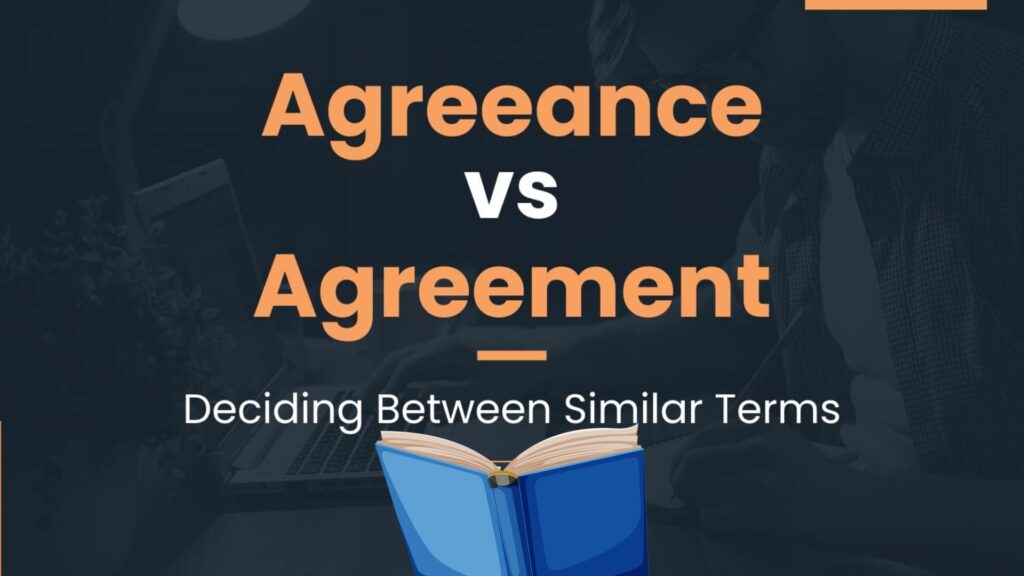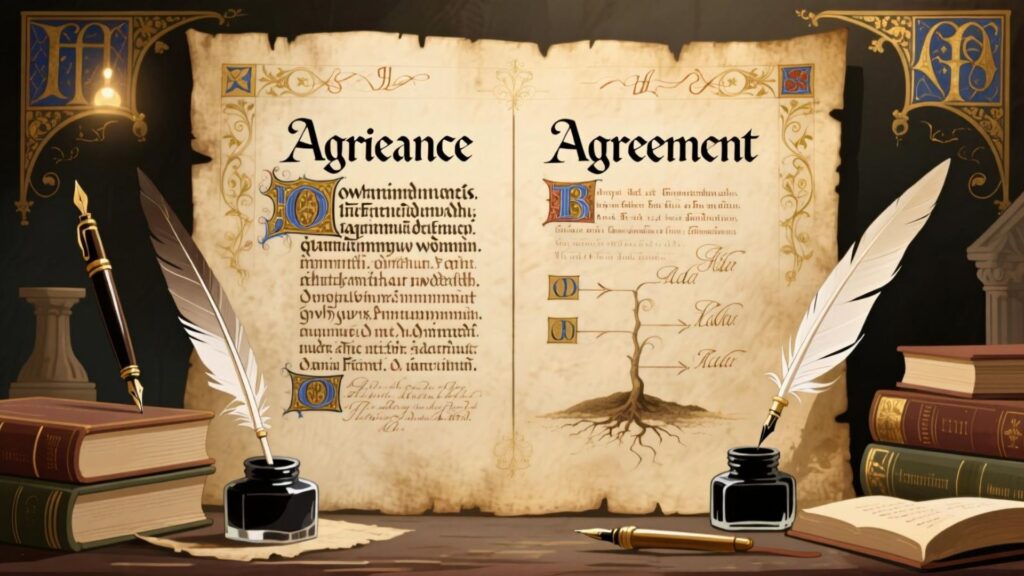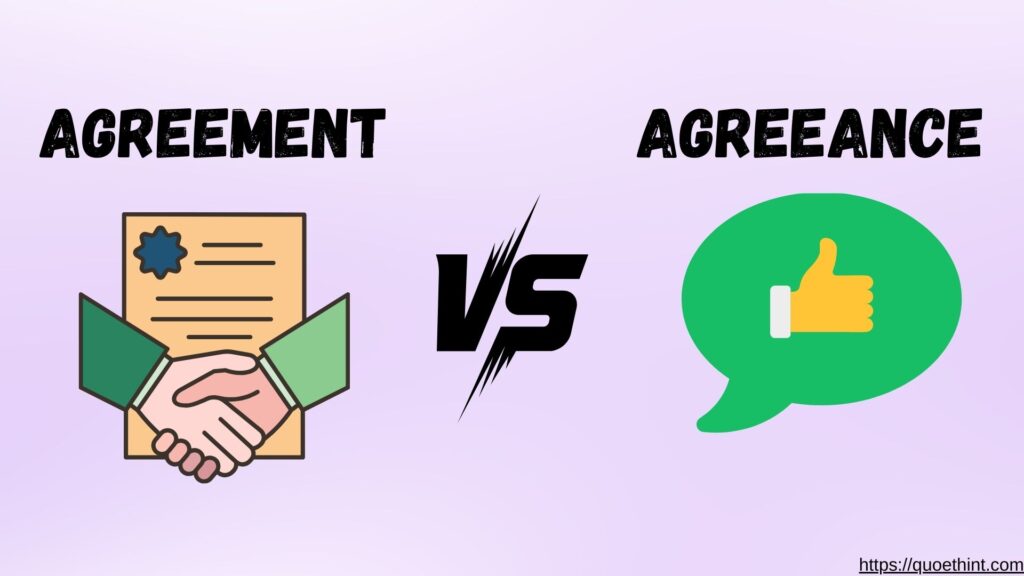English can be tricky, especially when two words seem almost identical. If you’ve ever asked yourself whether to use agreeance or agreement, you’re not alone. Both words hint at a mutual understanding, but there’s more to it than meets the eye. In this article, we’ll explore their differences, usage, and examples so you can confidently choose the correct term.
Agreement vs Agreeance: Intro Explanation

At its core, agreement is the modern, standard term used in both spoken and written English. It refers to a state of being in agreement or a shared understanding between two or more people. Agreeance, however, is largely considered outdated. While technically correct, it appears mainly in historical texts or very formal contexts, and most contemporary readers will find it unusual.
Think of it like this: agreement is your everyday handshake, while agreeance is an old-fashioned bow still technically valid but rarely used.
Simple Definition + Usage Overview
- Agreement: A mutual understanding or arrangement between parties. Common in formal communication, business writing, and contracts.
Example: The marketing team reached an agreement on the campaign budget. - Agreeance: An archaic term for agreement. Found in Scottish English or older literature. Rarely seen in modern professional writing.
Example: I am in full agreeance with your opinion. (Sounds outdated)
Clear Rules & Patterns
Understanding when to use agreement vs agreeance is simple once you follow a few patterns:
✅ When to Use Agreement
- In formal and professional communication
- In contracts, legal contexts, or business emails
- Anytime you want clarity and modern usage
✅ When to Avoid Agreeance
- In contemporary professional writing
- When clarity is key; most readers expect agreement
- In emails or reports; it can sound archaic or confusing
Bulleted Rules with Do’s and Don’ts
Do:
- Use agreement when documenting decisions or shared understandings
- Use agreement in legal contracts, negotiation emails, or formal reports
- Ensure the word fits the modern professional tone
Don’t:
- Use agreeance in business or academic writing
- Overcomplicate your language by opting for old-fashioned synonyms
- Confuse readers with unusual or obscure terms
Multiple Example Sentences
Here are examples showing agreement and agreeance in context:
- ✅ The two companies signed an agreement to collaborate on new technology.
- ✅ We are all in agreement about the proposed schedule.
- ❌ The committee expressed its agreeance with the policy. (Sounds outdated)
- ✅ I’m in complete agreement with your suggestions.
Scenario Examples: Email Usage
Professional Email Using “Agreement”
Subject: Confirmation of Agreement
Hi Linda,
I’m pleased to confirm that we’ve reached an agreement regarding the project timeline. Our team will prepare the revised contract and send it to you by Friday.
Please let me know if you have any questions or need additional details.
Best regards,
James Roberts
Email Using “Agreeance” (Rare and Not Recommended)
Subject: In Agreeance
Dear Tom,
I am writing to express my full agreeance with your recommendations. They align perfectly with our overall strategy.
Looking forward to working together.
Cheers,
Emma Clarke
(Notice how unusual it sounds in modern communication this is why it’s rarely used.)
Common Mistakes & Fixes
Many people mistakenly use agreeance when agreement is intended. Here are some examples:
- ❌ “We came to an agreeance last night.”
✅ “We came to an agreement last night.” - ❌ “I’m in agreeance with your feedback.”
✅ “I agree with your feedback.”
✅ “I’m in agreement with your feedback.” - ❌ “The parties reached an agreeance on the terms.”
✅ “The parties reached an agreement on the terms.”
Historical Origins of Agreeance and Agreement

Understanding why these words exist helps clarify usage:
- Agreeance comes from the suffix -ance, forming a noun from the verb “agree.” It was common in older English and sometimes appears in Scottish literature.
- Agreement, with the suffix -ment, became the preferred term in modern English due to its clarity and wide acceptance in legal and professional writing.
Essentially, both words mean the same thing, but agreement is what you’ll want to use 99% of the time.
Before/After Examples in Everyday and Formal Contexts
Before (Incorrect):
The team came to an agreeance about the new policy.
After (Correct):
The team came to an agreement about the new policy.
Before (Incorrect):
She expressed her agreeance with the manager’s suggestions.
After (Correct):
She expressed her agreement with the manager’s suggestions.
Quick Reference Table
| Word | Modern Use | Tone |
|---|---|---|
| Agreement | ✅ Yes | Standard, professional |
| Agreeance | ❌ Rarely | Archaic, outdated |
Tips for Remembering Which to Use
- Agreement = Modern, professional, clear
- Agreeance = Rarely used, old-fashioned, mainly historical
- In any business email, contract, or report, always default to agreement
- Think: “agreement” is the handshake everyone recognizes”
Final Thoughts
Language evolves, and some words fall behind. Agreeance had its moment centuries ago, but today, agreement rules. Using agreement in your writing ensures clarity, professionalism, and accessibility. Avoid confusion and keep your English modern choose agreement every time.
Bugti is the founder of Quoethint.com, a hub for English language tips, writing advice, and grammar guidance. With years of experience in English studies and a passion for clear communication, Bugti created this platform to make grammar and writing easy to understand for everyone.
